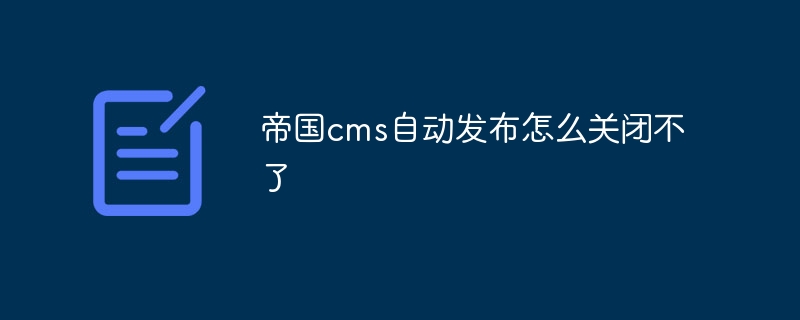Home >CMS Tutorial >Empire CMS >Why can't I turn off automatic publishing in Empire CMS?
Why can't I turn off automatic publishing in Empire CMS?
- 下次还敢Original
- 2024-04-17 00:37:45550browse
Imperial CMS automatic publishing can be turned off through the following steps: 1. Log in to the backend; 2. Navigate to System Settings > Basic Settings; 3. Set "Automatic Publishing" to "No"; 4. Click " Submit" to save changes. If it cannot be shut down, check the task scheduler, scheduled release script, or system errors. After closing, articles need to be published manually.

What should I do if the automatic publishing of Empire CMS cannot be turned off?
Empire CMS is a powerful content management system that automatically publishes articles at specified times by default. But sometimes, users may want to manually control the publishing process instead of relying on the automatic publishing feature.
The steps to turn off automatic publishing are as follows:
- Log in to the Imperial CMS backend.
- Navigate to "System Settings" > "Basic Settings" .
- Find the "Auto-publish" setting.
- Set the "Auto-publish" option to "No".
- Click the "Submit" button to save changes.
If the above steps fail to turn off automatic publishing, there may be the following reasons:
- Task Scheduler is not closed. Check whether there is a scheduled publishing task in Windows Task Scheduler and delete it.
- The planned release script still exists. Find the scheduled release script (usually task.php) in the /e/admin/tools/task/ directory and delete it.
- There is a system error. Check the Empire CMS log files for any error messages.
After turning off automatic publishing, users need to manually publish articles. The specific steps are as follows:
- Edit the article to be published.
- Select "Publish" in the "Status" option.
- Click the "Submit" button.
The above is the detailed content of Why can't I turn off automatic publishing in Empire CMS?. For more information, please follow other related articles on the PHP Chinese website!

